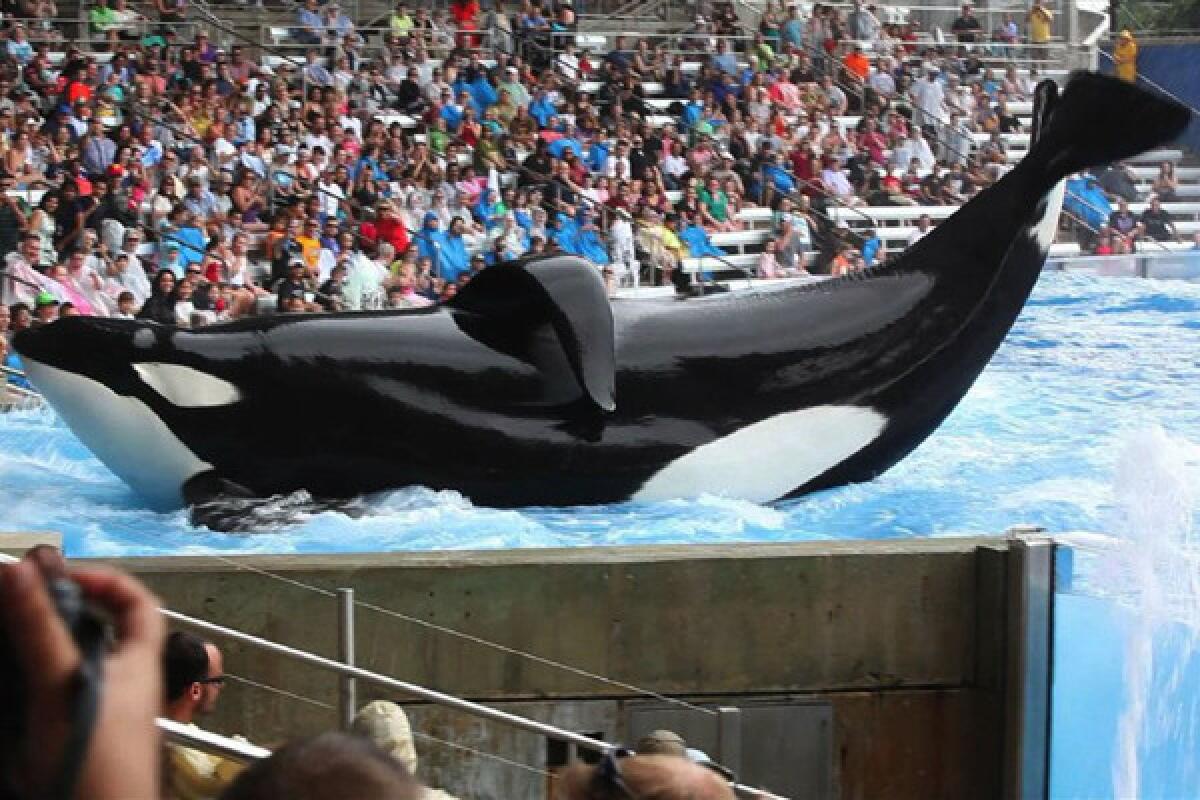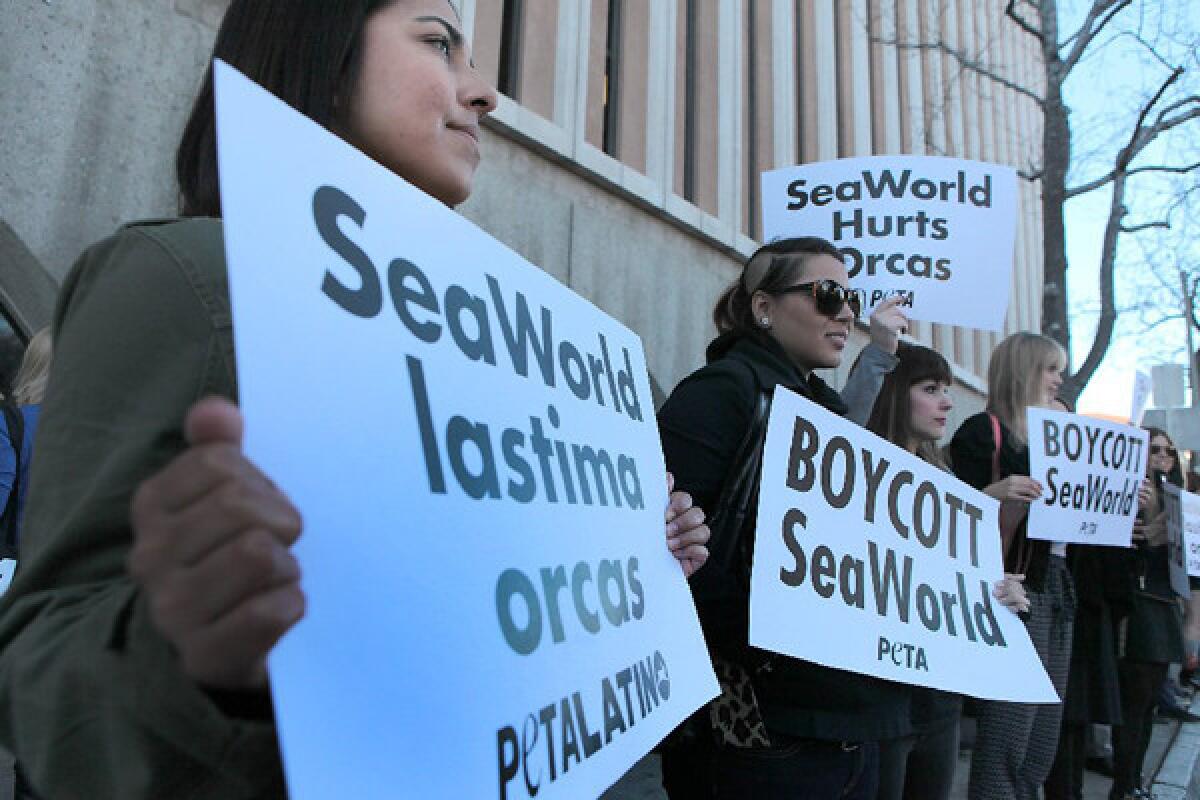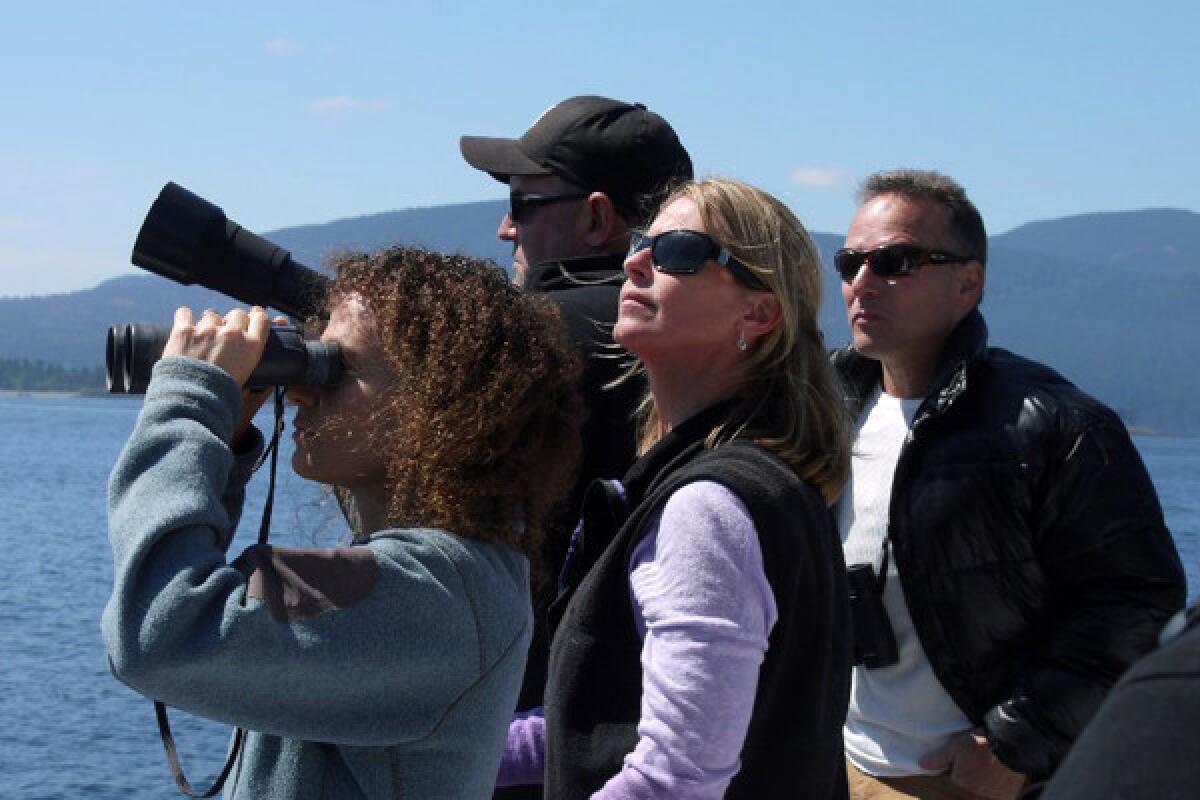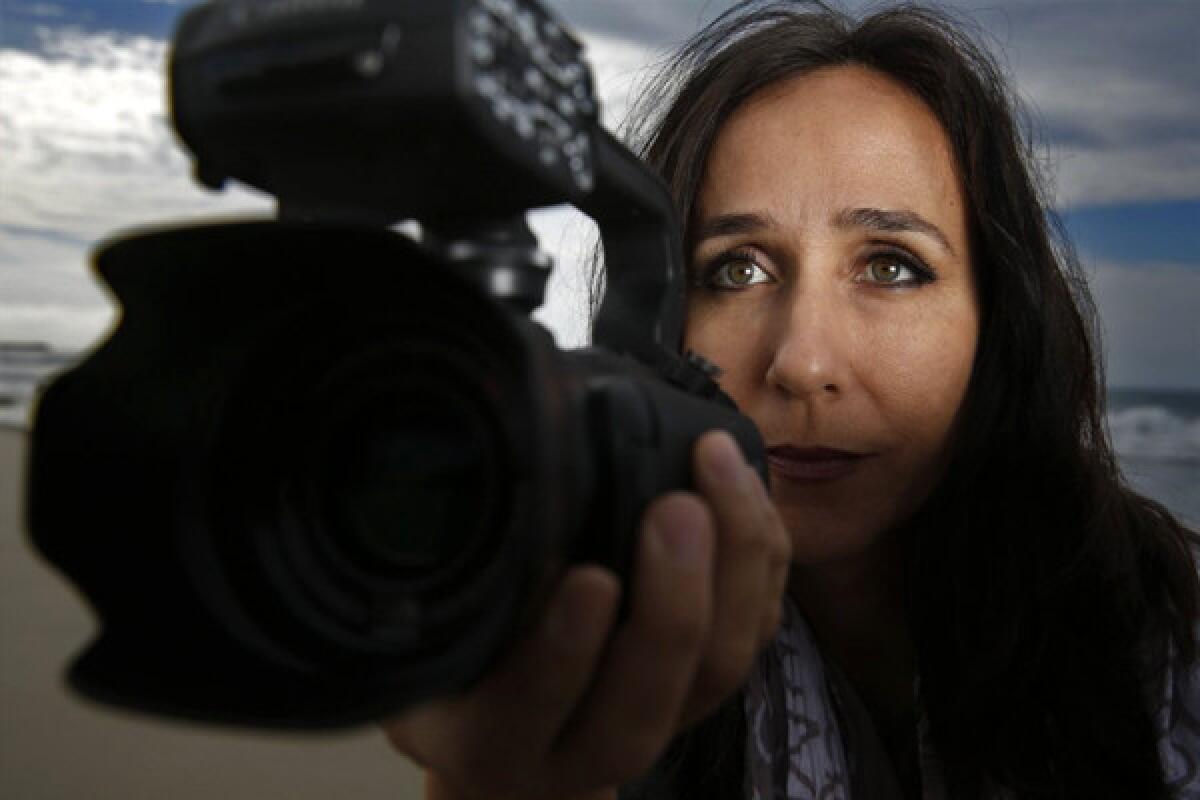‘Blackfish’s’ director, now its ‘steward,’ finds it hard to move on
Gabriela Cowperthwaite saw ‘Blackfish’ through festivals and awards season, and now continues with school screenings and more despite, she says, not making money on it. She feels a responsibility.
- Share via
Gabriela Cowperthwaite looked out the window of a train at the ocean and the bros surfing and the fish taco stands whizzing by.
"I'm antsy," she said, shifting in her seat. She checked her cellphone, which she had largely been ignoring all day. There were a few messages about work prospects, and another from her husband about their 7-year-old twin boys.
Usually, Cowperthwaite drives her sons to their school in Venice. But on this Monday in February, she had been with thousands of other kids, touring middle schools to answer questions about her documentary "Blackfish."
This wasn't where she thought she'd be a year ago, when the film about the plight of killer whales performing at SeaWorld premiered at the 2013 Sundance Film Festival. But "Blackfish" has since become one of the most controversial documentaries to hit theaters in a decade.
High-profile musicians have canceled gigs at SeaWorld, and dozens of celebrities have tweeted about the movie, urging their followers to stop going to the theme park. Animal rights activists turned up at both the Macy's Thanksgiving and Rose parades to protest the company's whale-centric floats.
In December, SeaWorld bought full-page ads in eight newspapers, rejecting allegations of animal mistreatment. Jim Atchison, the company's president and chief executive, insists most park guests "see the story for what it is — an activist agenda."
The experience has engulfed the 43-year-old Colorado native, who had only one feature film under her belt before "Blackfish." She spends her days sitting for interviews or traveling to screen her film. Because her movie was nominated for a handful of prizes, she also braved the awards season gantlet, walking red carpets and attending stuffy rubber chicken dinners.
"I even put on fake lashes today," she said, pointing to her otherwise makeup-free face. An oversized bouquet of flowers she'd received as a gift from a school mom rested on the empty seat beside her, beginning to wilt.

"There are so many people who live and breathe cetaceans," filmmaker Cowperthwaite said. "It was important for someone outside that world to deliver the message in 'Blackfish,' because I think I made it relatable in a way it hadn't been before. (Sarah Hoffman / Magnolia Pictures)
It's what most filmmakers dream of — particularly those who make low-budget documentaries. But devoting all of her energy to "Blackfish" has also left Cowperthwaite unable to move on to new work.
"I've been doing this for over a year now, and have come this far as a steward, which seems to have worked," she said as the train approached Los Angeles. "So I feel a kind of responsibility to keep steering this in the right direction. But just how do you continue to do that when in your heart of hearts you know that you should be moving on to your next film?"
A gangly arm rose above the crowd seated in the auditorium at Monroe Clark, a middle school 15 minutes from SeaWorld.
"Um," the teenage girl began, "How much money did you make from making this movie?"
Cowperthwaite smiled tellingly, pausing before she answered.
"Wait," the girl said, "are you saying you didn't make any money?"
"Zero," the filmmaker responded.
I feel a kind of responsibility to keep steering this in the right direction.”— Cowperthwaite
"Say whaaaaa?" one boy yelled, causing a teacher to rush over to reprimand him as the rest of the room erupted into applause.
By her own admission, Cowperthwaite isn't a "business-minded shark." But she's no idiot, either.
While working toward a PhD in political science at USC more than a decade ago, she took a documentary class and was hooked. So she started interning at a company that made documentary-style programming for the Discovery Channel and National Geographic. Soon, she was directing a series about the Iraq war for the History Channel, and went on to create an independent documentary, "City Lax," about inner-city kids who play lacrosse, that she sold to ESPN.
She started thinking about making a film on SeaWorld after taking her sons there. They sat in the splash zone, where they were sprayed with water by an orca's massive tail. Cowperthwaite was floored by the beauty of the whales' speed and strength, but when a trainer stood on one of the animal's backs, she cringed.
"There's something about it that felt wrong, but I couldn't figure out what it was, exactly," she recalled. "There's so much glitz and you're subjected to thumping music and bright colors and smiling people, so you become kind of anesthetized."
Still, Cowperthwaite couldn't shake the uneasy feeling she got at Shamu Stadium. When she returned home to her modest bungalow in Culver City, she started researching the death of Dawn Brancheau, a trainer who had been killed by a 12,000-pound orca, Tilikum, during a performance at SeaWorld in Orlando, Fla., in 2010.

Animal rights activists turned up at both the Macy's Thanksgiving and Rose parades to protest the company's whale-centric floats. Here, Gabby Soto, left, of Wilmington, holds a sign protesting Sea World's treatment of orcas outside the Pasadena Courthouse. (Brian van der Brug / Los Angeles Times)
She spent hours camped out in front of her laptop in her office — the kitchen table — while her husband, an emergency room doctor, was at work. After only a few months of investigating, she knew she had enough material to make "Blackfish." But she'd never been especially into the environment, and wasn't sure whether whales in captivity warranted the attention of, say, child war refugees.
"This was never my cause, and there were times when I questioned whether or not I should be doing this documentary when all this stuff was happening in Syria," she said. "I was like, 'That's the story that needs to be told. It's carnage, and so horrendous.' You feel like you can only throw moral fortitude behind one thing."
But her treatment piqued the interest of Judy Bart and Erica Kahn, who were looking to get into the film business. They put up an initial investment — enough to fund the first few months of production and keep Cowperthwaite and her producing partner, Manny Oteyza, afloat.
But with at least six more months left to go to complete the film, the financiers said they had no more money to give. Desperate to complete the film, Cowperthwaite and Oteyza would defer a year's worth of salary if Bart and Kahn could contribute enough to finish the picture. (Bart and Kahn declined to comment on the film's financing for this article.)
I'm already ready to lend my voice to something else. And this film is not done.”— Cowperthwaite
When the movie was acquired at Sundance by CNN and Magnolia Films for roughly $1 million, all of the money went back to recouping the investors' costs. Since its July release in theaters, the movie has grossed more than $2 million; it also debuted on CNN in October, and has now been seen by roughly 25 million viewers.
If "Blackfish" ends up making enough money through DVD and on-demand sales, Cowperthwaite may possibly get some additional pay. But for now, she said, she "hasn't made a penny" off the sale.
"Early on, I could be talked out of thinking I had this amazing asset," she said. "Everyone kept telling me, 'Look, documentaries don't do that well in theaters. Most don't make their money back. And animal documentaries don't do well.' Everyone convinced me that they were taking this enormous risk on me."
Veteran documentarians like Louie Psihoyos, whose dolphin slaughter documentary, "The Cove," won an Oscar in 2010, offered Cowperthwaite advice on how to stand up for herself. But Psihoyos — who gave up a lucrative gig taking photographs for National Geographic to make environmental films — is sympathetic to her predicament.
"Gabriela is now part of the vortex we all get swept up in," he said. "When you start to realize that you have the potential to really move the needle forward on big issues, it feeds you in ways that can be much more profound than just getting a paycheck."

Samantha Berg, Dean Gomersall, Carol Ray and Jeffrey Ventre in the documentary "Blackfish." Since the film's July release in theaters, the movie has grossed more than $2 million; it also debuted on CNN in October, and has now been seen by roughly 25 million viewers. (Manny Oteyza / Magnolia Pictures)
Although "Blackfish" has permeated popular culture, it remains to be seen how much the film might affect SeaWorld's bottom line.
An estimate of the parks' annual attendance figures from 2013 won't be publicly reported until June, but the company's stock has faltered in recent months. The company may face further backlash following the proposal this month of new legislation that would stop captive killer whale breeding and ban the import and export of orcas in California.
Which leaves Cowperthwaite in a somewhat uncomfortable position.
"Blackfish," she says, is now a part of her DNA. The movie has changed the way she looks at the world. She feels bad for keeping her two dogs in a small backyard, half of which is overtaken by a pool. Her house is littered with random orca memorabilia — salt-and-pepper shakers, blow-up pool toys — that friends have bought for her. One buddy even made her a makeshift Oscar — a piece of wood spray-painted gold with a papier-mache whale glued on top — that she keeps on her kitchen counter. (Although the film was among the nominees on the Academy of Motion Picture Arts and Sciences' documentary short list, it didn't make the final cut.)
And yet she still doesn't feel like she's the best spokeswoman for whales.
"There are so many people who live and breathe cetaceans," she said. "It was important for someone outside that world to deliver the message in 'Blackfish,' because I think I made it relatable in a way it hadn't been before. But, like, I'm antsy. I'm already ready to lend my voice to something else. And this film is just not done."
Follow Amy Kaufman(@AmyKinLA) on Twitter
Follow @latgreatreads on Twitter
More great reads
Bangladesh women find liberty in hard labor

I like it here, I make my own decisions. I can earn money and help my family. ”
In Ukraine, the jobless replace the revolutionaries

Only good movies
Get the Indie Focus newsletter, Mark Olsen's weekly guide to the world of cinema.
You may occasionally receive promotional content from the Los Angeles Times.










